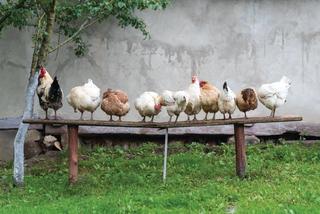Maintaining Health in Your Mixed Poultry Flock


Raising a mixed poultry flock can be a colorful and rewarding experience, blending different species into one lively community. But with that diversity comes a unique set of challenges, particularly when it comes to maintaining flock health and managing the social dynamics among your birds.
Let’s walk through the common health issues you might encounter in a mixed flock; how to prevent them and how to keep peace in your feathered family.
Health Challenges in Mixed Poultry Flocks
When different species share the same space, their varying needs and susceptibilities can make health management a bit more complex. Some common health issues to watch out for, along with strategies to keep your birds in top shape are below:
Respiratory Problems
Respiratory diseases, such as Infectious Bronchitis and Mycoplasma, can spread quickly in a mixed flock, particularly when birds have differing levels of immunity. To prevent this, ensure your coop is well-ventilated and free from dust and ammonia buildup.
Quarantining new or sick birds before introducing them to the flock is also crucial.
Parasite Control
Parasites like mites, lice and worms can pose significant health risks, especially in mixed flocks where different species may be affected differently. Regular cleaning of the coop, coupled with a deworming schedule and the use of parasite control products, can help keep these pests at bay.
Consider providing dust baths with diatomaceous earth to help your birds naturally fend off external parasites. If mites still present after treating holistically, there are some over the counter options. In addition, a veterinarian can assist in recommendations and treatment plans.
Meeting Nutritional Needs
Different poultry species have unique dietary requirements. A one-size-fits-all approach to feeding can lead to nutritional deficiencies. It’s important to offer species-specific feeds and supplements to ensure all birds are getting the nutrients they need.
To avoid competition at feeding time, ensure that every bird has easy access to food and water.
Avian Influenza
Mixed flocks can be at higher risk for avian influenza, particularly if they have exposure to wild birds or new birds without proper quarantine.
Implementing strict biosecurity measures — such as controlling flock access, disinfecting footwear and keeping wild birds away — can reduce the risk of an outbreak.
Foot Care
Foot problems, like bumblefoot, can arise when different species with varying foot structures share the same environment.
To prevent these issues, provide appropriate perching options and keep bedding clean and dry. Regular foot inspections can help catch problems early before they become serious.
Managing Social Dynamics and Aggression
Keeping a peaceful mixed flock is not just about maintaining health, it is also about understanding and managing the social dynamics that naturally arise among different species.
Here’s how to foster harmony among your birds.
Understanding Pecking Order
Every flock establishes a pecking order, but in mixed species flocks, this can lead to bullying, especially if larger or more dominant birds pick on smaller ones. To minimize conflict, make sure your birds have plenty of space, multiple feeding stations, and separate perching areas.
Keep an eye on interactions and step in if you notice any birds being overly aggressive.
Introducing New Birds
Bringing new birds into an established flock can be tricky and often results in temporary upheaval. Introduce new birds gradually, allowing them to see and interact with the existing flock through a barrier before full integration.
This slow introduction helps minimize stress and reduces the likelihood of serious conflicts.
Respecting Species-Specific Behavior
Different species have different behaviors and needs. For instance, ducks may spend more time in water, while chickens prefer dry, dusty areas. Tailoring the environment to meet the needs of all species can prevent stress and aggression.
Providing species-specific spaces and enrichment activities is key to keeping everyone happy.
Preventing Bullying
In any mixed flock, there’s a risk that more dominant birds will bully the less assertive ones, leading to stress, injury, or even death. Regular monitoring is essential.
If bullying becomes a problem, consider creating separate spaces or providing hiding spots where less dominant birds can escape if needed. Sometimes, rehoming a particularly aggressive bird is the best option.
Environmental Enrichment
Boredom and overcrowding can lead to increased aggression as birds look for ways to assert dominance or entertain themselves. To keep your flock engaged, offer plenty of enrichment options, such as perches, dust baths and foraging areas.
Regularly rotating these enrichments can also help prevent boredom and reduce the risk of aggressive behavior.
Health and Harmony
Maintaining a healthy and harmonious mixed poultry flock requires a careful balance of proactive health management and thoughtful social strategies. By understanding the unique challenges that come with keeping a diverse group of birds and implementing the right preventive measures, you can enjoy the benefits of a lively, peaceful and thriving flock.
Tags:Poultry Lifestyle

Acreage Life is part of the Catalyst Communications Network publication family.
















